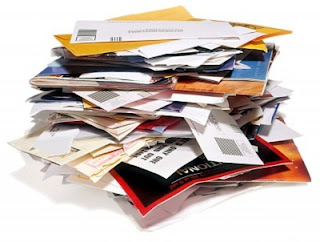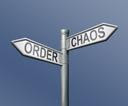See if you can make this a new habit!
- Do not set the mail down on a table for later. Walk to the trash/recycling can and pitch the junk (rip it/shred it up if it makes you feel better but this junk mail will probably not contain any sensitive information.) While you are at it, open any letters and toss the envelopes. Now walk the rest of the mail to your desk/bill paying area.
- Now you have a couple of options depending upon your personal filing system.
- File the bills into their designated file.
- For those who do not like to hold onto paper or simply do not have the space to file these things away. Get out your smart phone! Quickly snap a picture of the bill and either save it to a designated space on your cloud server or email it to yourself to be filed away digitally. Since clouds are not 100% reliable, I would be more inclined to file it into a designated folder on your cloud server AND email it to yourself, filing it then into a designated folders in your email account. That way more than one server has a copy. If that sounds like too much of a hassle, you should just do what you feel comfortable with. After you have a copy stored away you can toss the physical bill.
- Now that the bills are done, you can read any other correspondence, mark your calendars with any important dates and then recycle that mail as well.
- Next time you pay your bills set up ebills only. This will cut down on the important mail you receive.
- The Federal Trade Commission suggests visiting www.optoutprescreen.com to put a stop to unsolicited credit cared and insurance offers. This can help cut down on the amount of unsolicited mail you receive.
- If you are unable to pay a bill at the time it is received you may end up receiving duplicates. If this happens keep the original and then most current versions only. Everything in between can be discarded. You keep the first bill so that you will notice any discrepancies in the balance owed between the time the debt was incurred and the most recent billing cycle.
- If this is a debt you are paying a little at a time keep a tally sheet in the file with the bills so you can update it each time you make a payment. If you store your bills digitally a notepad or spreadsheet can be updated and stored in the folder with the statements.
In addition to mail we hold on to many other types of papers as well. Many are important but those should be treated with importance and put away. If you are having trouble making space for your important paperwork, check out my blog for organizing your files. If you can get all of your paper under control in your home you will really start to notice a difference in how tidy it feels. Happy filing friends!
Meredith









0 comments:
Post a Comment